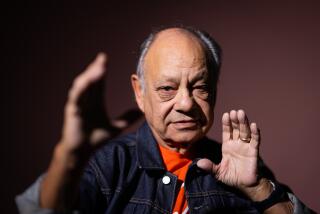Not just all comic magic
- Share via
IN SEPTEMBER, Cheech and Chong will reunite for a tour, 26 years after their last live performance. That is, if Cheech doesn’t read Tommy Chong’s newest book, “Cheech & Chong: The Unauthorized Autobiography.”
Here, Chong aims to detail the duo’s years of success, and to explain why they split. But the big smoke cloud he left in the 1970s and 1980s might have fogged his ability to focus, which he freely admits.
“I know some of you will thumb through the book and go directly to the end to find out what happens,” he writes in a prologue. “Well, don’t waste your time. Because that is not the way I write.”
The first third of “Cheech & Chong” rarely mentions Cheech or comedy, but details Chong’s pre-comedy career as a recording artist with Motown Records. He wrote the hit song “Does Your Mama Know About Me?” -- which, he claims, changed how Motown songwriters worked.
“Until ‘Does Your Mama Know About Me?’ came along,” he writes, “R&B; music had always consisted of love songs. Now songwriters started exploring the color barrier with their songs. ‘Papa Was a Rolling Stone’ and ‘Love Child’ come to mind as examples of this shift.”
It takes a while to figure out, but Chong spends so much time writing about music because it led to his comedy career. After an underground newspaper owner in Canada introduced him to his music reviewer, Richard “Cheech” Marin, an American dodging the Vietnam War, the two of them formed a band, and comic magic surfaced the night of their first gig.
“I told the guys that Rich and I would go out and warm up the crowd with some comedy,” Chong remembers, “and then we would play (or attempt to play) the tunes we rehearsed. . . . One bit melted into the next until we ended the show and had both forgotten entirely about the band sitting behind their instruments, waiting to play.”
Chong goes on to tell the story of their partnership -- from the early years playing club dates to their six hit albums and six films, including “Los Cochinos” and “Up in Smoke.”
As the book progresses, though, he occasionally gets distracted, detouring into rants about the government and illegal substances.
“People always ask me,” he writes, “if I think we could make the movies like ‘Up in Smoke’ today. And I tell them no. I was incarcerated for nine months simply because I made those movies back in the seventies and eighties. It is in the court records. I was incarcerated for nine months for taking responsibility for a box of glass water pipes that was shipped across state lines!”
Chong’s anger is understandable, but these topics were already covered in his first book, “The I Chong.” In any case, he seems to have forgotten that marijuana-based buddy movies -- such as “Harold & Kumar Go to White Castle” and the newly released “Pineapple Express” -- have been made in recent years, undoubtedly inspired by Cheech & Chong.
For all the duo’s high times, lack of communication doomed their relationship. They went to pitch meetings and financial negotiations without talking to each other first. Sometimes, they even wrote apart.
“While ‘Next Movie’ was being edited,” Chong recalls, “Cheech and I met with the heads of Columbia Pictures to pitch our next two films. . . . When we met outside the Columbia offices, Cheech asked me what stories we were going to tell them. I told Cheech that I had a few plot lines I was working on we’d have to just improvise.”
Although both men were at fault for the split, Chong blames Cheech for wanting to be something more than a clown. He seems especially incensed that his former partner took parts in “Nash Bridges” and “The Lion King.”
A telling moment comes when Chong recounts a question-and-answer session at the 2005 Aspen Comedy Festival.
“Cheech was wearing the suit he wore in ‘Nash Bridges,’ ” he writes, “and was very straight and dry in answering the questions. This was not the wise-cracking Chicano I had been partners with for fifteen years. . . . Someone asked him how difficult it was to change his ‘Chicano stoner image,’ and he replied, ‘It was like turning a big ship around.’ The moderator then asked me the same question and I answered, ‘I didn’t have to turn my ship around because it was going in the right direction.’ ”
So . . . about that tour?
--
More to Read
The biggest entertainment stories
Get our big stories about Hollywood, film, television, music, arts, culture and more right in your inbox as soon as they publish.
You may occasionally receive promotional content from the Los Angeles Times.










